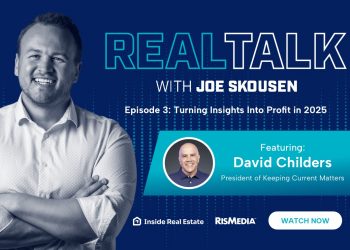RISMEDIA, May 10, 2008-Evolution is defined as the process of change in the inherited traits of a population of organisms from one generation to the next. That statement couldn’t be truer in the real estate industry. As we slowly shift more attention from Baby Boomers to Generations X and Y, industry prognosticators realize that the generations are evolving, and that change is both necessary and inevitable. Consumers today want more, and they want it faster and in the most convenient way. To that end, in this four-part series, we’ve asked four industry vets their thoughts on the matter.
 A Game Changer
A Game Changer
Charlie Young
Chief Operating Officer
Coldwell Banker Real Estate LLC
www.coldwellbanker.com
We are in the midst of one of the great “game-changing” time periods in real estate history. Many years from now, industry observers will look back at the early/mid-2000s and notice how not only the Web changed the home-buying and -selling process, but also how sales associates dealt with a market correction that followed an unprecedented bull run.
The Web has obviously impacted our business and the relationship we have with consumers, but not in the same way that the Web completely changed the travel industry. While the personal touch has all but completely disappeared there, our industry is much, much different.
The human touch is critical to the home-buying and -selling process due to the magnitude of the process, along with the emotional and financial implications.
Yet the Web has forced a change in how we interact with consumers. The process no longer begins and ends with a sales associate. Instead, it begins with two new phases where the consumer uses the Web prior to interacting with a real estate professional.
The initial “dreaming” phase, as we call it at Coldwell Banker, occurs anonymously as consumers search listings, home value estimators, streaming videos and navigate from website to website to learn about the process. As they enter the “initiating” phase, they remain anonymous, but now focus on determining which brand, company and sales associate they are interested in working with. During these two “infotainment” phases, the consumer is largely influenced by Web content along with brand or local operating company advertising, promotions and public relations efforts.
When the consumer is ready, they will make contact by phone or e-mail and, as has always been the case, the sales associate will expertly guide the consumer through the “shopping,” “negotiating” and “ownership” phases. However, about six months after move in, the process begins again as the consumer starts the “dreaming” phase all over again, likely thinking about possible home renovations all the way to imagining what their next home will look like.
While the Web has altered the process of attracting business, the market correction has forced us to take a hard look at how we talk to the consumer. You have heard the stereotypical responses that sales associates have gone from being “order takers” to “going back to basics.” But what does that really mean?
Buying and/or selling a home is stressful and consumer nerves are frayed even further today with constant media focus on market conditions, along with discussions about subprime and foreclosures.
Yet those sales associates who engage with their clients, counsel them, support them, mentor them and serve as a trusted advisor will grow their market share as referrals roll in. However, these relationships change on a case-by-case basis. As we have learned from superstar sales associates, knowing your audience, their knowledge base and sophistication with the home-buying and -selling process is critical and allows you to counsel them accordingly. Remember, all of the information that is available on the Web, along with the negativity surrounding home sales today, has caused many consumers to become paralyzed by anxiety or information overload.
Second, have a solid understanding of the nuances of pre-qualification programs, mortgage options and rates, tax implications of the purchase and/or sale of a home, along with an understanding of homeowner association fees, utility bills and other monthly costs that might be hidden to the consumer. This knowledge will allow you to nurture, calm and soothe your clients in the early phases of the process as you address their core fears and develop a strong relationship.
As the process continues, it is critical to continue the constant dialogue with your clients so you can determine who the key decision makers are, deliver doses of reality when warranted, discuss worst-case scenarios on home affordability, and prepare your clients for the home inspection and contract stages.
As the Web has changed the process, getting business is only one part of the equation. What you do with that business is what will really define you.
Next week, in Part II, Sherry Chris, president and CEO of Better Homes and Gardens Real Estate, asks the question-is your consumer more knowledgeable than you?










